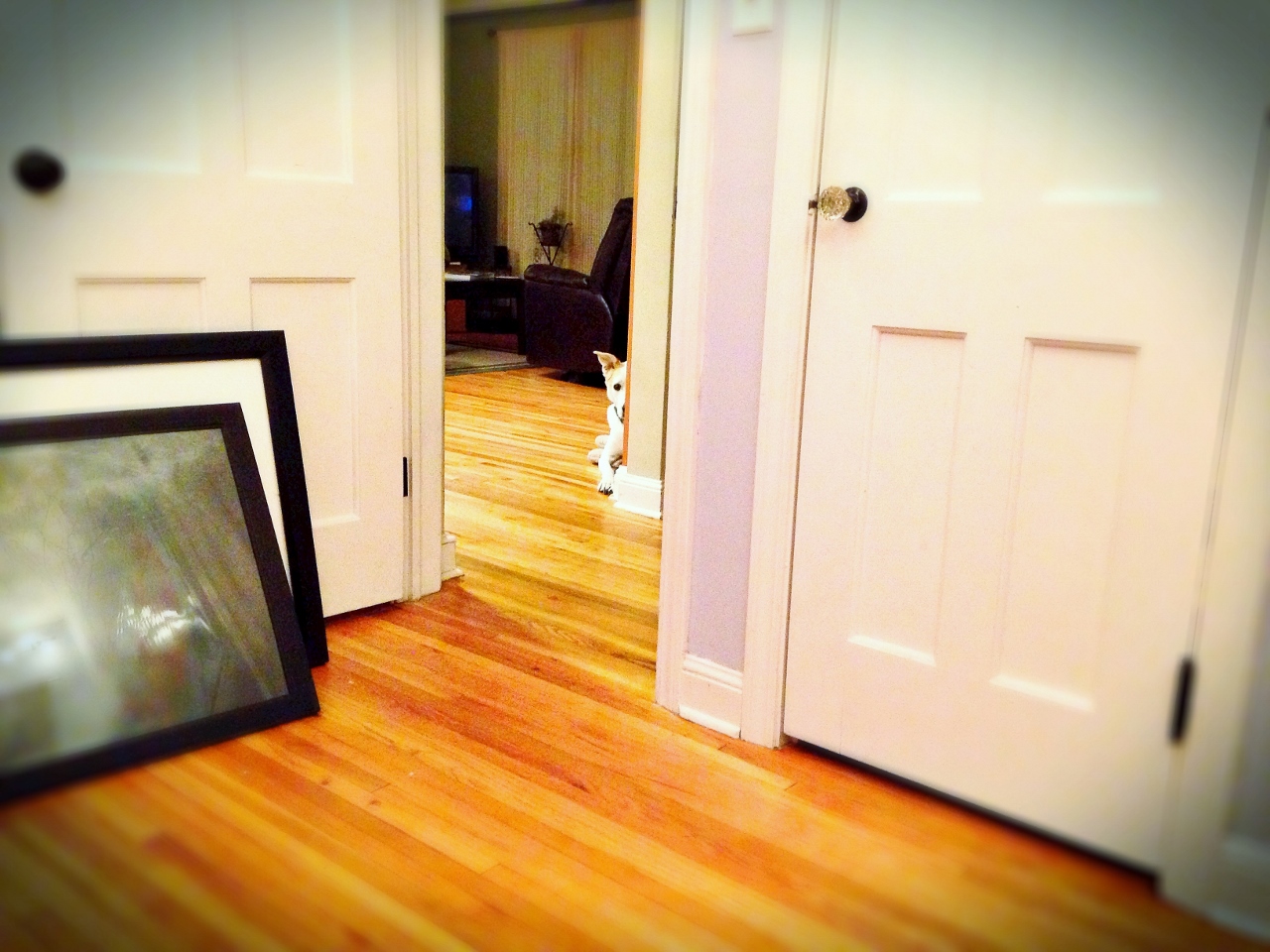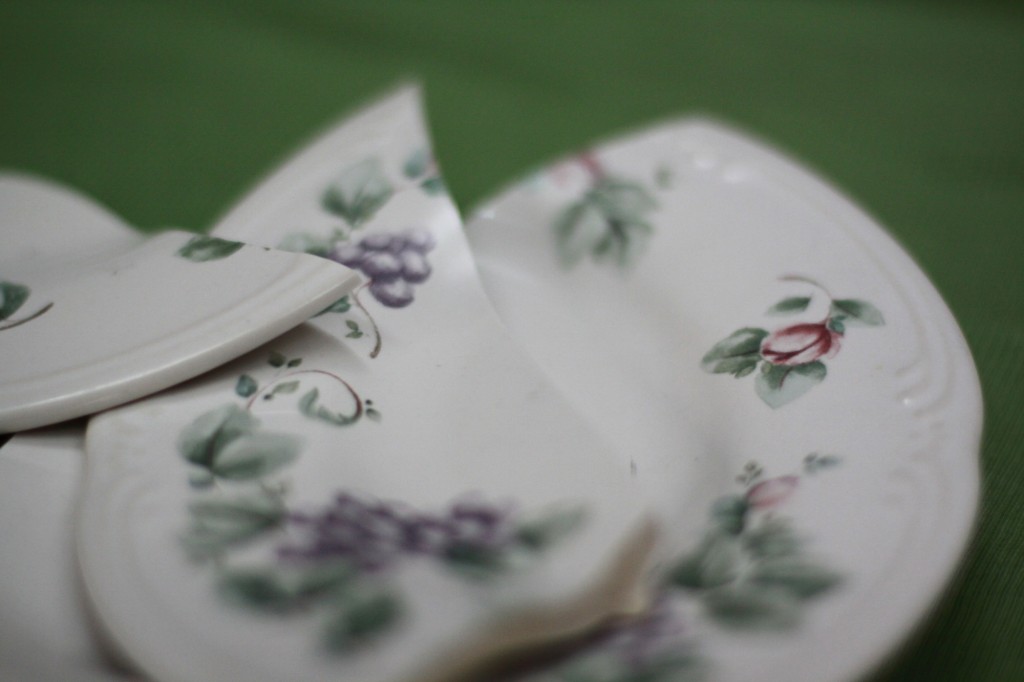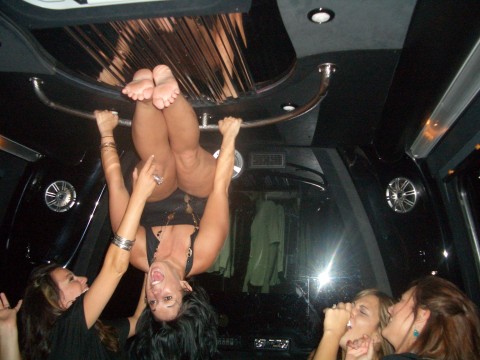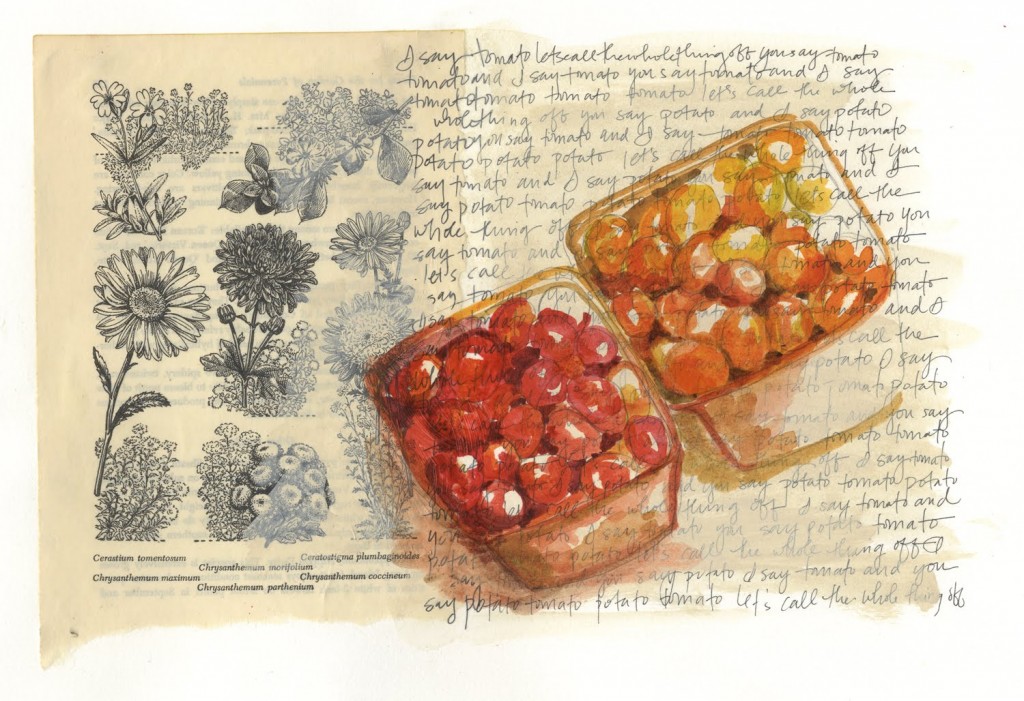
By Sara Bir
Washing dishes in the kitchen, I hear the click-clack of our dog’s claws approaching. Half border collie and half Jack Russell, he’s always on the move, forced to herd humans indoors when sheep and the outdoors were unavailable. The floors throughout our small house are hardwood, so Scooter’s whereabouts are constantly audible. At first his clacking drove us crazy, but as the months wore on we grew accustomed to it, and it became a comfort, a manifestation of a happy family idyll.
Turning from the sink to Scooter, I notice a thin, shockingly red trail lead from under his furry body out into the living room. Is he bleeding? He wags his tail and gazes at me placidly from his shiny black eyes, unfazed. Dogs are usually unfazed, which is why people have them.
Directly under his belly I spot a bundle of thick vermillion embroidery thread, which he must have dropped. Scooter isn’t wounded—he’s gotten into my things again. The scamp! He’s six, yet still lapses into puppy-like urges to destroy, and narcissistically prefers soft, small, fuzzy targets.
I follow the thread’s scarlet trail into the living room and then find its terminus in my office, where I also keep my sewing things. I realize Scooter poked his muzzle into a paper grocery sack full of notions I’d picked up at a craft swap the day before. Unraveled, the thread seems impossibly long, as if it stretches out to a hidden dimension, an implication of a path whose visibility would soon dissolve. I’m more upset with Scooter’s impishness than the loss of the thread itself, which I nabbed simply because it was free and maybe someday I’d use it for something.
•••
For socks. That’s what is used it for. Our friend Matt had asked me to embroider socks for him to wear to the airport. Matt is a thinker but also an incurable stirrer-upper. He got a quickie Universal Life Church online ordination to officiate our wedding—he did an excellent job—and in his opening remarks he predictably cited Nietzsche. Shortly after that my husband and I moved to another state, and we carried on our friendship with Matt via emails and a thing we call mail art, which is us sending each other lumpy envelopes stuffed with amusingly bizarre odds and ends (or, more truthfully, garbage).
His sock concept was thus: as he went through security, his shoes in a plastic bin being x-rayed, he wanted the toes of his stocking feet to read
POLICE STATE
It was an unwise decision to enable this scheme of Matt’s. I hated to think of the socks causing a ruckus. This was at the tail end of the George W. Bush era, and the often arbitrary-seeming protocols of the Transportation Safety Administration were still freshly stinging to both civil liberties and personal convenience. Matt would be flying to his hometown with his young son to visit his family, his first trip back east since his wife had divorced him six months earlier. It was an acrimonious split. Always eccentric, Matt’s actions had taken an erratic, wounded bent since.
But in the quiet of my office I stared at the thread, Scooter laying by my side, and it called to me. I cut it into three knotty segments and wound it into three balls. Scooter whined; he wanted attention, or the thread, or both. He was still new to us at the time. My husband and I found him at the Humane Society, where, technically, he was on sale because his first adoptive family had returned him after two days. He was lovable and gentle but hampered with serious abandonment issues, and he demonstrated his resentment at being ignored by peeing or chewing on absorbent, valuable items. When we first spotted him, he had a tennis ball lodged in his mouth, like the apple in the jaws of a roast suckling pig.
Scooter’s fur was immanently touchable, soft and silky and peltlike. His insistence on being near me at all times struck a chord with my vanity, too. If I read on the sofa and Scooter sidled up next to me, his tiny, warm body lounging right against mine, I had to occasionally put the book down, so overcome was I with waves of contentment.
About thirty blocks from our house was a lovely, large park on an extinct volcano. I’d suit Scooter in his blue nylon harness and jaunt past the drug dealers next door, then past the used car dealerships and the broad-daylight sex workers on the corner. We crossed over to the nice side of the neighborhood, where the yards had well-tended flower beds and wooden play structures and elaborate handcrafted lawn ornaments. Then we’d go up the hundreds of steps to the top of the expired volcano and be above everything.
Sometimes at night, I walked Scooter a few short blocks after dark. His white fur glowed with an icy blue tint under the streetlights and his black leash melted against the backdrop of the asphalt, and he appeared to swim into the darkness, moving forward unceasingly into space, into oblivion.
Sometimes on walks my mind melded with Scooter’s and we journeyed together aware of nothing but what was around us at that moment. Usually I mulled over silly things, though, like the challenge of how to embroider letters on tube socks. It was very gratifying when I had a breakthrough, enough so that I ignored my instincts to refuse the project. My brainstorm was to embroider POLICE and STATE on two while felt patches, which Matt could Velcro or glue to the socks himself.
I had plenty of important things to do—get my Oregon driver’s license, complete my music column, write a card to my best friend to welcome her new baby into the world, look for a better job.
I didn’t do those things. I seized the red thread. I sewed the stitches and sealed the deal.
•••
Scooter was our baby. We needed him to fill the holes in our American dreams. I yearned to raise intelligent, sensitive children who would someday be soldiers of reason in this pre-Apocalyptic world of ours. Periodically, searing waves of resentment befouled my mood then retreated into a sea of resigned acceptance. I had crappy insurance, and no coverage through work. I had no sick leave, either. We couldn’t function without two incomes, but my income was dwarfed by what solid child care would cost.
We did it anyway. We had the child. It was selfish, really; there was no way we could afford to raise a kid in the middle-class manner we assumed was our birthright. “We’ll make it work!” I’d insisted. We named her Frances. She eclipsed Scooter.
He did not take it well, and he chewed up two quilts, a handmade Winnie-the-Pooh, and various other lovingly crafted baby shower gifts. Every day after work when she was young, I buckled Frances into the stroller and clipped Scooter’s leash to it with a carabiner, and we went on a million aimless walks through our neighborhood, up the volcano and down again. Scooter stopped to poop and I collected his petite turds in narrow blue bags that the newspaper was delivered in. It gives me a strange satisfaction to imagine those turds preserved in a landfill for thousands of years, nestled right next to Frances’s pee-saturated disposable diapers. I hated having to buy them, but was proud of myself for finding the ones that cost the least per unit. They were called Cuddle-Ups, and were the store brand at the twenty-four-hour grocery outlet where I obsessively compared prices on bulk products and produce sales. I liked Cuddle-Ups for not having cartoon characters on them and not smelling like a baby powder explosion. I always got unscented baby things because I adored Frances’s default baby smell, the one she came with. Every case of Cuddle-Ups gave me dozens more opportunities to bury sodden time capsules of my daughter.
I still like the way Frances smells. She often wakes up in the middle of the night and staggers robotically to our big bed and slides in next to me, and when I wake up I nuzzle the top of her head and I take in the nice plain smell of her little girl hair. Another parent might be doing the exact same thing as their house gets bombed. Another parent might miss the smell of her little girl’s hair because her daughter was killed or taken away by an evil that’s steadily creeping its way to us. Another parent might have no comfort but the notion of his child’s pee in a diaper in a landfill outlasting life on earth.
•••
Frances has been peeing in toilets for ages, and her current contribution to landfills is the plastic packaging of the plastic crap all kids in America seem to accumulate against the wishes of their parents, even though usually it’s us parents who buy it for them. Scooter is sixteen now, we think. He’s slower but continues to shadow me all over the house. There’s no way he could make it up the volcano these days, and he can’t rally the enthusiasm to chew anything but his food. I carry him up the stairs and am thankful for his compact size.
Nothing bad happened when Matt bared his embellished socks in the airport security line. That happened later, and gradually. Matt now has two ex-wives, and he’s not allowed to see his kids. The reason isn’t as awful as you might imagine, but the preposterousness of the situation is beyond imaginable and thus incredibly awful. Essentially, he did a bunch of little things demonstrating poor judgment, amounting to a pile of POLICE STATE socks that were used against his favor.
But I am equally guilty of lapses in judgement. I embroidered those socks; I lavish more attention on our dog than I do on the man I am married to; I scowl at people who buy bottled water while I myself get those cans of fruit-flavored fizzy water; I tap on icons on my phone and dive into digital wormholes while the entire natural world churns on, hobbled from my gas emissions and industrial runoff, without me noticing or caring. I board airplanes as a white, American-born woman and don’t have to consider if my nationality or skin color might lead to my forced removal from an overbooked flight or the denial of my reentry to the country. “We’ll make it work!” I still insist. I choose to be ignorant because I am arrogant.
•••
The bed Frances crawls into is a king-size bed, the epitome of living large. My husband and I are slender people, and there’s no decent reason for us to have such an upgrade, but my sleeping patterns have improved slightly since we bought the thing. Even so, I get nudged awake by Scooter or Frances in the middle of the night and find myself unable to slip back into slumber. Unresolvable blockades in my mind force themselves to the center of my thoughts, things that are ultimately of little consequence: overdue bills, overdue writing assignments, teaching appearances, or roller derby bouts I have coming up. The stillness of the evening turns menacing, and even as I remind myself the world will not end if I don’t turn my cookbook manuscript in on time, I suspect the cookbook or the overdue bill is an innocent front for a universal menace. Why did we have a kid when I sincerely believe human existence will be vastly, miserably altered in our lifetimes? Why do we spend so much emotion and energy—so much—on this one goofy dog, when around the world, societies collapse? Why does it feel like no big deal as our society collapses?
In the midst of these episodes, I consider the peace of having Joe and Frances and Scooter so close to me, and how perhaps experiencing that is as good a reason as any to have been alive for even a minute. Our king-size bed is a chunk of pack ice breaking off from a polar ice shelf, the penultimate level of an epic video game, and every night we will it to float us into the abyss of our destiny, the frigid ocean waters as black and sleek as obsidian. And we are together and it’s kind of okay.
I step outside of our lives and see us sliding deeper into the ocean lurking in our unassuming house. The vermillion thread winds a path all through the rooms and up the stairs, unspooling as Scooter trots ahead into the shapeless distance with an inexhaustible wad in his mouth, leading us to a land with no exit. We reach out and grasp the thread and yieldingly follow it where it takes us, into the closet down a rabbit hole to the end of the world, and the thing that I mind the most is that we don’t seem to mind much at all.
•••
SARA BIR is a regular contributor to Full Grown People. Her first cookbook, Tasting Ohio, comes out in 2018. Currently she is working on a cookbook about foraged fruit.

 Follow
Follow








